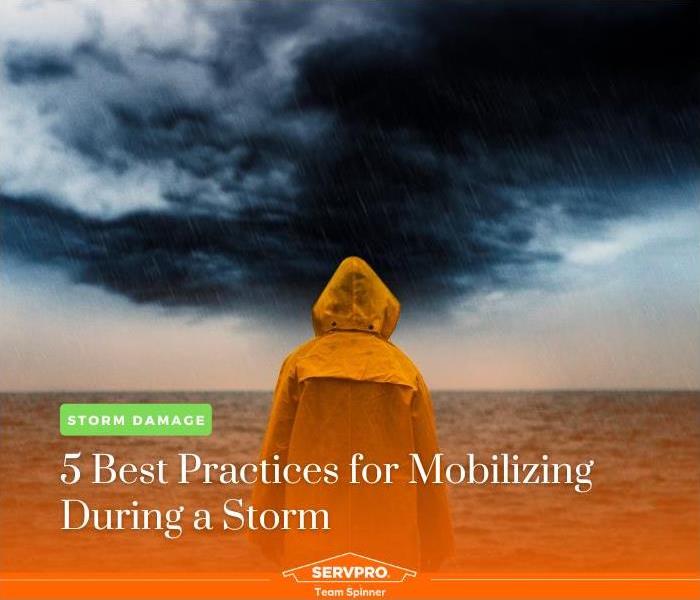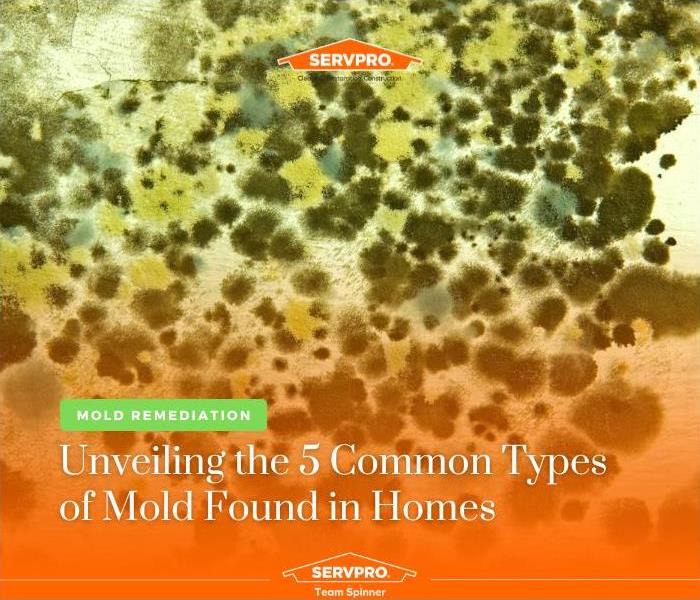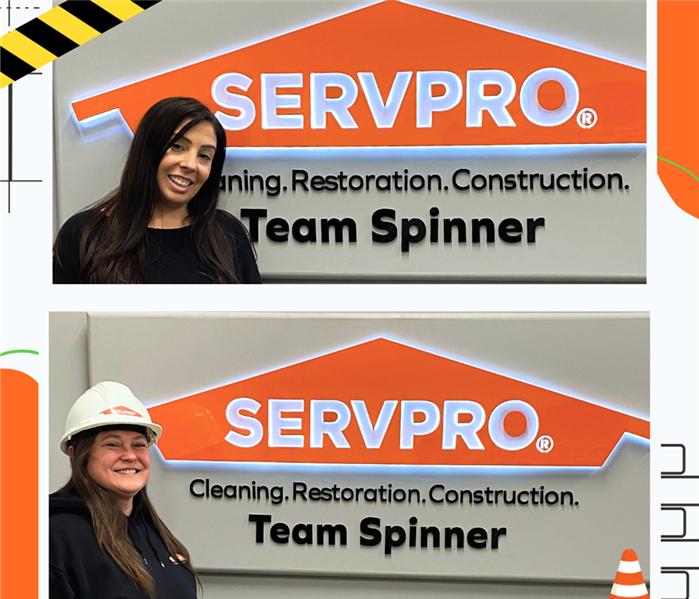Recent Posts
Lightning Safety Tips: Protecting Yourself and Your Property
6/26/2024 (Permalink)
 Stay Safe During Storms!
Stay Safe During Storms!
Lightning strikes are a natural and awe-inspiring phenomenon, but they can also be incredibly dangerous. Each year, lightning causes numerous injuries, fatalities, and property damage. Our team prioritizes your safety and well-being. Here are some essential lightning safety tips to help you stay safe and protect your property during thunderstorms.
1. Stay Indoors During Storms
The safest place to be during a thunderstorm is indoors. As soon as you hear thunder, seek shelter immediately. Avoid using electronic devices connected to wall outlets, as lightning can cause power surges. If you're inside a building, stay away from windows, doors, and any metal objects that can conduct electricity.
2. Avoid Water and Plumbing
Water is an excellent conductor of electricity. During a thunderstorm, avoid using plumbing fixtures such as sinks, bathtubs, and showers. Lightning can travel through pipes and water systems, posing a risk of electrocution.
3. Unplug Electronics
To protect your electronics from power surges caused by lightning strikes, unplug them before the storm hits. This includes computers, televisions, and other valuable devices. Using surge protectors can also help reduce the risk of damage.
4. Avoid Outdoor Activities
If you’re caught outside during a thunderstorm, find shelter immediately. Stay away from open fields, hilltops, and bodies of water. Avoid tall objects like trees, poles, and metal fences, as they attract lightning. If no shelter is available, crouch low to the ground with your feet together and minimize contact with the ground.
5. Stay in Your Car
If you’re driving when a thunderstorm begins, stay in your vehicle. Cars provide good protection against lightning due to their metal frame. However, avoid touching metal surfaces inside the car during the storm.
6. Wait It Out
Wait at least 30 minutes after the last clap of thunder before leaving your shelter. Thunderstorms can produce multiple lightning strikes even after they seem to have passed.
7. Prepare Your Home
Install lightning rods on your home to direct strikes safely into the ground. Ensure that your home’s electrical system is grounded correctly. Regular maintenance and inspection of these systems can help reduce the risk of lightning-related damage.
8. Know the Signs
If you see dark, towering clouds and hear distant thunder, take it as a sign to prepare for a potential thunderstorm. Stay informed about weather conditions through reliable sources and follow any advisories or warnings.
9. Educate Your Family
Teach your family members about lightning safety and create a plan for what to do during a thunderstorm. Ensure that everyone knows the safest places to seek shelter and the actions to avoid.
10. After the Storm
Once the storm has passed, inspect your property for any damage. If you notice any issues such as electrical problems, water leaks, or structural damage, contact professionals for immediate assistance. SERVPRO Team Spinner is here to help with post-storm cleanup and restoration, ensuring your home returns to its safe and comfortable state.
Be Prepared and Stay Safe
Lightning safety is crucial for protecting yourself, your loved ones, and your property. By following these tips, you can reduce the risk of injury and damage during thunderstorms. If your property does suffer damage from a lightning strike, trust our team to provide prompt and professional restoration services.
Stay safe, stay informed, and remember that SERVPRO Team Spinner is here to help you through any storm. Contact us for assistance with storm damage restoration and ensure your home is always protected.
Ensure Clean, Healthy Air with SERVPRO Team Spinner!
6/10/2024 (Permalink)
 It's important to have quality air
It's important to have quality air
Did you know that regular HVAC and air duct cleaning can significantly improve your indoor air quality and boost your system's efficiency? Dust, allergens, and contaminants can build up over time, affecting your health and comfort.
Air pollution can increase anyone’s risk of heart disease, stroke, respiratory infections, and more. But it’s especially dangerous for those with lung diseases such as asthma. Air quality changes from day to day, but events like wildfires and environmental disasters can make it worse.
There is little we can do to change the air quality outside but adequate filtration and regular maintenance of our central air conditioning system can vastly improve it in our homes.
Central HVAC ducts are made of metal or in some cases of poor quality installations, heavy-duty foil and aluminum tape. The cracks and crevices in the ducts not only allow air leakage, but they also allow dust and debris in. Your dusty, dirty attic air is forced through your ducts and into your home, decreasing your overall air quality.
The quality of the air inside your home is important, since most people spend the majority of their time indoors and much of that time inside their homes. Low air quality can cause allergy symptoms and can aggravate lung conditions like asthma.
It can also help improve the efficiency of HVAC systems and reduce energy costs. It's recommended to have ducts cleaned every 3 to 5 years or more frequently if pets, smokers, or people with allergies or respiratory conditions are present in the home.
Don't wait! Contact SERVPRO Team Spinner today to schedule your HVAC and air duct cleaning. Breathe easier and live healthier!
5 Best Practices for Mobilizing During a Storm
5/3/2024 (Permalink)
 You've got a big storm coming? Here's what to do.
You've got a big storm coming? Here's what to do.
As a leader in disaster recovery and mitigation, SERVPRO Team Spinner understands the importance of preparation and readiness when it comes to severe weather events. Whether it's a hurricane, tornado, or severe thunderstorm, mobilizing effectively can make all the difference in ensuring the safety of yourself, your loved ones, and your property. In this blog post, we'll share five best practices for mobilizing during a storm, along with a call to action to encourage proactive preparedness.
1. Stay Informed: Keeping informed about weather forecasts and updates is essential for making informed decisions during a storm. Use reliable sources of information such as NOAA Weather Radio, weather apps, or local news outlets to stay abreast of changing weather conditions and potential risks.
2. Prepare an Emergency Kit: Assemble an emergency kit containing essential supplies such as non-perishable food, water, flashlights, batteries, first aid supplies, medications, and important documents. Make sure your kit is easily accessible and includes enough provisions to sustain you and your family for at least 72 hours.
3. Secure Your Property: Take proactive measures to secure your home and property against potential damage. Reinforce doors and windows, trim trees and shrubs, and secure outdoor furniture and equipment. Consider installing storm shutters or boarding up windows to protect against high winds and flying debris.
4. Have a Communication Plan: Establish a communication plan with family members, neighbors, and loved ones. Designate a point of contact outside the affected area who can serve as a central coordinator for communication and information sharing. Ensure that everyone knows how to reach each other in case of separation or evacuation.
5. Follow Evacuation Orders: Heed evacuation orders issued by local authorities. If instructed to evacuate, do so immediately and follow designated evacuation routes to safety. Take only essential items with you and leave early to avoid traffic congestion and hazardous conditions.
Don't wait until the next storm is on the horizon to prepare. Take action now to ensure that you and your loved ones are ready to weather any storm that comes your way. Browse our website for more information on storm preparedness and to learn how our team can help you recover and rebuild in the aftermath of a severe weather event. Together, we can weather the storm and emerge stronger on the other side.
Karl Spinner Shares Tips with CBS NY on Home Preparation for Severe Weather
4/29/2024 (Permalink)
 Getting information out on multiple platforms is always beneficial for the community.
Getting information out on multiple platforms is always beneficial for the community.
Recently, SERVPRO Team Spinner had the privilege of collaborating with CBS New York for an insightful interview featuring our very own owner, Karl Spinner. The filming took place last week in honor of Severe Weather Awareness Week. During the interview, Karl shared valuable tips and advice on how homeowners can prepare their properties for severe weather events.
As a trusted expert in disaster restoration and mitigation, Karl's insights offer valuable guidance for protecting homes and families in the face of adversity.
Severe weather events, such as hurricanes, storms, and floods, can pose significant threats to homes and properties. By taking proactive measures to prepare for these events, homeowners can minimize the risk of damage and ensure the safety of their families. Karl highlighted the critical steps that homeowners can take to safeguard their homes and mitigate potential risks.
Karl shared that it is important to have a house where water can go away from the home. From having clean gutters to ensuring they divert the water away from the home, property owners can expect to reduce flood risks.
He also suggests to invest in a liquid dam and a sump pump, while giving tips on how to use each item when you have them.
As a reference before using a sump pump, owners must make sure there is no debris for easy water removal. In addition, make sure that your sewer clean out is secure.
If you haven't seen it yet, we've added the segment below, but you can also watch it on CBS New York's official YouTube channel at: https://youtu.be/m59FmlUgjV4?si=UAre0nNr6K6-l4sD
This week in New Jersey, we have luckily been receiving great weather.
However, severe weather can come as a surprise.
If you ever find yourself facing water damage in your home or business, do not hesitate to contact us at 908-650-8611 or email us at gtipton@SERVPROwessex.com.
Our expert team specializes in water damage, cleanup, and restoration. SERVPRO Team Spinner can restore your property to its preloss condition in no time.
We are The #1 Choice in Cleanup and Restoration.
We're Here to Help ® 24/7.
SERVPRO Team Spinner Joins Forces for 2024 Earth Day Cleanup
4/23/2024 (Permalink)
 Our team is committed to continuing our efforts to make a difference in our local communities.
Our team is committed to continuing our efforts to make a difference in our local communities.
SERVPRO Team Spinner proudly kicked off National Volunteer Week and Earth Day by joining the 2024 Earth Day Cleanup hosted by Mayor Chris Bollwage of City of Elizabeth NJ - City Hall and the New Jersey Clean Communities.
At SERVPRO Team Spinner, “Serve Our Communities” is one of our team’s core values. So on Earth Day, our team had the privilege of participating in the 2024 Earth Day Cleanup. This event not only allowed us to give back to our local community but also underscored our commitment to sustainability and making a positive impact on our planet.
The cleanup was a testament to the collective effort to protect and preserve our natural surroundings. Armed with gloves, trash bags, and determination, our team joined volunteers from across the city to tackle litter and debris in parks, streets, and public spaces. Together, we rolled up our sleeves and got to work, embodying the spirit of Earth Day by taking tangible action to improve our environment.
Beyond the physical act of cleaning up litter, our participation in the cleanup served as a platform to raise awareness about environmental issues and the importance of sustainability. Through our actions, we hoped to inspire others to adopt eco-friendly practices, reduce waste, and become stewards of the planet.
We all deserve clean streets and a clean environment. It's crazy that Earth Day is only one day of the year. Nonetheless, join us in making a difference for our planet! Participate in clean up events, reduce waste, and advocate for our environment.
Every action counts.
Let’s work together for a healthier Earth!
Honoring SERVPRO Moms: Celebrating Working Moms Day
3/15/2024 (Permalink)
 Today, we celebrate you, SERVPRO moms, and all that you do
Today, we celebrate you, SERVPRO moms, and all that you do
As the world commemorates National Working Moms Day, SERVPRO Team Spinner takes immense pride in honoring the remarkable mothers within our team. These incredible women exemplify dedication, resilience, and the remarkable ability to balance their professional and personal lives with grace. Today, we shine a spotlight on our SERVPRO® moms, celebrating their unwavering commitment and contributions to both their families and our company.
Celebrating your mom shouldn’t be limited to one day a year.
Being a working mom is a juggling act, requiring unwavering strength and flexibility. SERVPRO Team Spinner moms seamlessly navigate the demands of the workplace while nurturing and supporting their families with love and care. Whether responding to emergencies, managing projects, or providing support to their colleagues, these multitasking mavens demonstrate extraordinary skill in balancing their dual roles.
Today, we celebrate the incredible working moms on our team who balance career and family with grace and determination. Janice, Gina, Anabel, Ashley, Katelynn, Renee, and Janet are more than just working moms. They are educators, role models, and breadwinners for their children and the next generation.
They make up part of Team Spinner and we wouldn’t be where we are today without these hardworking women.
Happy National Working Moms Day from SERVPRO Team Spinner! Your resilience, strength, and unwavering dedication inspire us all. Thank you for your tireless efforts, your boundless love, and your remarkable contributions.
Unveiling the 5 Common Types of Mold Found in Homes
3/15/2024 (Permalink)
 If you experience mold damage, SERVPRO® Team Spinner is available to help 24/7 with cleanup and remediation.
If you experience mold damage, SERVPRO® Team Spinner is available to help 24/7 with cleanup and remediation.
Do you know what's growing on your walls?
Mold is an unwelcome guest in any home, capable of causing not only structural damage but also health concerns for its inhabitants. Understanding the types of mold commonly found in homes is crucial for effective remediation and prevention. In this blog post, SERVPRO® Team Spinner sheds light on five of the most prevalent types of mold encountered in residential settings.
1. Stachybotrys (Black Mold): One of the most notorious types of mold, Stachybotrys, commonly referred to as black mold, thrives in damp and humid environments. It often appears black or dark green and is typically found in areas with water damage, such as leaky roofs, basements, and bathrooms. Black mold releases mycotoxins, which can cause health problems.
2. Aspergillus: Aspergillus is a widespread genus of mold that encompasses numerous species, some of which are known to cause health problems. Aspergillus can be found indoors and outdoors and is commonly found in damp areas such as bathrooms, kitchens, and basements. It appears in various colors, including green, white, and yellow.
3. Penicillium: Penicillium is a type of mold commonly associated with water-damaged materials, such as drywall, wallpaper, and carpeting. It has a fuzzy texture and can appear in shades of blue, green, or white. While some species of Penicillium are used to produce antibiotics, others can produce mycotoxins that may cause health issues when present in indoor environments.
4. Cladosporium: Cladosporium is a mold commonly found both indoors and outdoors, thriving in areas with high humidity levels. It can appear black, green, or brown and is often found on damp surfaces such as carpets, wood, and HVAC systems. While Cladosporium is not typically as toxic as other types of mold, it can still cause health problems.
5. Alternaria: Alternaria is a common outdoor mold that can also find its way indoors, particularly in areas with water damage or excessive moisture. It appears dark green or black and is often found in damp areas such as showers, basements, and kitchens. Exposure to Alternaria can trigger health effects.
Mold can be a serious problem for homeowners and businesses alike.
Not only can it cause damage to property and belongings, but it can also lead to health effects.
It’s important to have a basic understanding of the different types of mold and how to identify them, so you can take the necessary steps to protect your home or business from mold-related damage.
Identifying the presence of mold in your home is the first step towards effective remediation and prevention. If you suspect mold growth in your home, it's essential to address the issue promptly to protect both your property and your health. SERVPRO Team Spinner stands ready to assist with professional mold remediation services, helping you restore a safe and healthy environment for you and your family. Contact us today to learn more about our mold remediation services and how we can help you tackle mold problems in your home.
Not sure if it's mold? Send it to us and we'll evaluate it for you! Email us at gtipton@SERVPROwessex.com or call 908-650-8611 to speak to a representative at Team Spinner regarding your might-be-mold.
Celebrating Women in Construction: Honoring Their Impact on International Women's Day
3/8/2024 (Permalink)
 Happy International Women's Day & Happy Women in Construction Week!
Happy International Women's Day & Happy Women in Construction Week!
As the world celebrates International Women's Day, we take a moment to shine a spotlight on the remarkable women who are making strides in the traditionally male-dominated field of construction. At SERVPRO® Team Spinner, we recognize and celebrate the invaluable contributions of women in shaping the construction industry and breaking barriers along the way.
10.8% of construction workers in the United States are women, according to the 2023 report by the Bureau of Labor Statistics (BLS).
For too long, construction has been viewed as a realm reserved for men. However, women across the globe are challenging these stereotypes and proving that they belong in this dynamic and multifaceted industry. From architects and engineers to project managers and tradeswomen, women are leaving their mark on construction sites and inspiring future generations to pursue their passions fearlessly.
The construction industry is still primarily male-dominated, with women constituting only a small fraction of the workforce. Despite these obstacles, women persist in forging their paths in this industry.
International Women's Day 2024's campaign is #InspireInclusion and it falls perfectly within National Association of Women in Construction Week™.
We have a total of 14 women at SERVPRO Team Spinner, with two women being on our construction team. Our construction coordinators Katelynn Ryan and Jaime inspire inclusion to us by addressing further areas supporting the advancement of women and girls.
As advocates for change and equality, we encourage everyone to take action to support women in construction and beyond. Whether it's through mentorship programs, diversity initiatives, or simply recognizing and amplifying women's voices, each of us has the power to make a difference and create a more equitable world for all.
Both Katelynn and Jaime continue to pave their way in an industry dominated by men and inspire inclusion for other women who are interested in being in construction. As the rate of women in construction in the United States grows, our team will too.
And these women will make history.
SERVPRO Team Spinner Extending a Helping Paw to Union County’s PetCare Drive
2/23/2024 (Permalink)
 SERVPRO Team Spinner with the Union County Board of County Commissioners & the Department of Public Safety
SERVPRO Team Spinner with the Union County Board of County Commissioners & the Department of Public Safety
“Serve Our Communities” is one of five of SERVPRO® Team Spinner’s core values.
In alignment of community support and giving back, our team took the initiative and recognized the importance of assisting local animal shelters and pet rescue organizations. This initiative reflects our commitment to making a positive impact and spreading compassion to all members of our community, including those with paws and tails.
February is a month full of love – How else can we show love for the lives of our furry companions and the people in our community who take care of them?
The answer is by coming together to donate to the PetCare Drive hosted by the Union County Board of County Commissioners & the Department of Public Safety.
Pet drives play a crucial role in providing essential supplies and resources to animal shelters and rescue organizations. These facilities often rely on donations to meet the needs of the animals under their care, including food, bedding, toys, and medical supplies. By supporting pet drives, we can help ensure that shelter animals receive the care and comfort they deserve while awaiting adoption or placement in forever homes. With food and toys from Chewy to cleaning materials from SERVPRO, we at SERVPRO Team Spinner are grateful for the opportunity to contribute a substantial number of supplies to the welfare of animals in need. It takes a heart full of compassion and a desire to make a difference and the team came together to make this substantial donation to the pet drive. Each item donated represented a gesture of kindness and a commitment to improving the lives of our furry companions.
Our team looks forward to continuing our efforts to support worthwhile causes in the future.
The impact of our donation extends far beyond the physical items themselves. It represents a collective effort to support our local community and demonstrate compassion for all living beings. The supplies we donated will directly benefit countless animals, providing them with the care and comfort they need to thrive while in temporary shelter. We hope these animals get the food, toys, and happiness they need while they wait for their forever home.
We believe that every act of kindness, no matter how small, has the power to make a meaningful difference in the lives of others. As we continue our journey of service and compassion, we invite others to join us in spreading love and support to those who need it most, including our furry friends. Together, we can make the world a better place for all beings, one donation at a time.
SERVPRO Team Spinner Together for SERVPRO Team Breakfast
2/22/2024 (Permalink)
 Before serving business, Karl Spinner served breakfast!
Before serving business, Karl Spinner served breakfast!
As the sun rose over the horizon, the SERVPRO® Team Spinner team gathered bright and early for a special occasion – our annual State of the Company address. But before diving into the day's agenda, we kicked things off in the best way possible – with a hearty breakfast that brought together colleagues, camaraderie, and anticipation for what lay ahead.
The scent of sizzling bacon and fluffy pancakes as team members filled their plates and gathered around communal tables filled the room. Guess who was cooking the food? That's right! Our wonderful team leader, Karl Spinner. Not only does he lead and inspire us to give back to our community, he gives back to his team by serving us breakfast. Truly, connections were strengthened that morning.
As we savored our breakfast delights, we took a moment to reflect on the journey that brought us here and the milestones we've achieved together as a team. Karl Spinner shared the goals we reached last year in 2023. We prepare ourselves for our goals this year of 2024. 2023 truly was a great year. We hit numbers but of course, we also missed some. He reminded us that's why "goals" are called goals. There's no failing, because it's not like we didn't try. But now we have to try even harder to hit this year's goals.
The SERVPRO Team Spinner team breakfast served as more than just a prelude to the state of the company. It was a celebration of our collective achievements and a source of inspiration as we embarked on the next chapter of our journey together in 2024.
That morning was a great opportunity for the whole team to come together to eat, bond, and kick off our day with laughter!






 24/7 Emergency Service
24/7 Emergency Service








